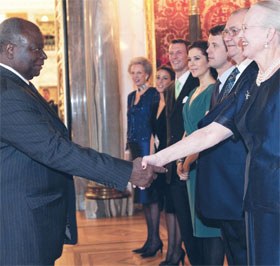By PPS
President Kibaki has appealed to world leaders to support the strengthening of the United Nations Environment Programme (Unep) based in Nairobi.
Addressing the UN Framework Convention on Climate Change Conference (UNFCCC) in Copenhagen, Denmark, Kibaki said Kenya is ready to host an upgraded Unep that will effectively spearhead global efforts towards environmental conservation.
"We stand ready to host a revamped Unep that will have the mandate to help lead the global fight against environmental degradation," he said.
Response plan
He restated the Government’s commitment to environmental conservation, saying efforts to address climate change have been stepped up.
 |
President Kibaki is received by the Royal Family of the Kingdom of Denmark, led by Her Majesty Queen Margrethe II during a gala dinner she hosted for the heads of state and government in Copenhagen. [PHOTO: PPS] |
He cited the formulation of a National Climate Change Response Strategy and a resource mobilisation plan as an example of the commitment.
He added that through relevant ministries, the Government has developed a programme that would guide an environmental investment plan to cost about $2.2 billion per year over a 20-year period.
He also pledged the Government would ensure the country increases its forest cover from the current two per cent to 10 per cent by 2030.
He said through the environmental investment blueprint, the Government plans to shift to a low carbon emission development pathway in response to climate change.
"We are also committed to making further investments in renewable energy technologies such as wind and geothermal power production," he said.
Noting that the estimated cost for green energy production locally is $25 billion over the next 21 years, he underscored the need for transfer of technologies, financing and capacity building.
He reiterated the country’s support for African position on climate change, which is guided by the Bali Roadmap that is based on adaptation, mitigation, technology transfer, capacity building and finance.
He underscored Africa’s stand to give priority to adaptation programmes that have predictable and sufficient funding.
"We see an urgent need to reduce the adverse effects of climate change while addressing some of the deep-rooted development concerns. These concerns include access to adequate energy, food security, prevention of conflicts and the fight against poverty," he said.
Future generations
Kibaki, at the same time, emphasised the need for the UNFCC to live up to its principle of protecting the climate for the benefit of the present and future generations as they seek to agree on a post-Kyoto regime.
"This framework is clear with regard to equity and responsibility of different actors," he noted.
He pointed out globally accepted principles of democracy and good governance that apply at national level should also apply at the international level.
He asked developed countries to assist developing countries access appropriate technologies at realistic cost to enable them effectively address climate change.
He was accompanied by Foreign Affairs Minister Moses Wetang’ula, Environment Minister John Michuki, Regional Development Minister Fred Gumo and Forestry and Wildlife Minister Noah Wekesa.
 The Standard Group Plc is a multi-media organization with investments in media
platforms spanning newspaper print operations, television, radio broadcasting,
digital and online services. The Standard Group is recognized as a leading
multi-media house in Kenya with a key influence in matters of national and
international interest.
The Standard Group Plc is a multi-media organization with investments in media
platforms spanning newspaper print operations, television, radio broadcasting,
digital and online services. The Standard Group is recognized as a leading
multi-media house in Kenya with a key influence in matters of national and
international interest.
 The Standard Group Plc is a multi-media organization with investments in media
platforms spanning newspaper print operations, television, radio broadcasting,
digital and online services. The Standard Group is recognized as a leading
multi-media house in Kenya with a key influence in matters of national and
international interest.
The Standard Group Plc is a multi-media organization with investments in media
platforms spanning newspaper print operations, television, radio broadcasting,
digital and online services. The Standard Group is recognized as a leading
multi-media house in Kenya with a key influence in matters of national and
international interest.










